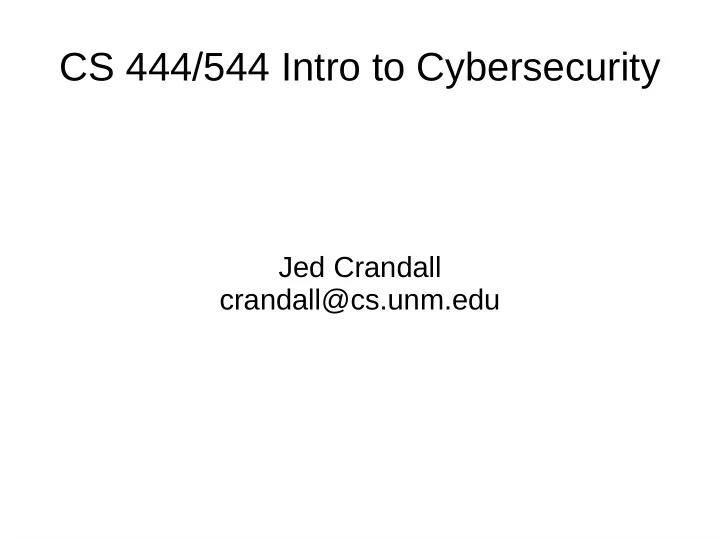

CS 444/544 Intro to Cybersecurity Jed Crandall crandall@cs.unm.edu
A little about me ● Professor in the Dept. of Computer Science at UNM – Will start at ASU on June 1 st ● Grew up in Northern California in Donner Party country – If you can't understand my spoken English, let me know ● Learned to program from my mom (and the Apple II BASIC manuals that were laying around the house) ● Undergrad from Embry-Riddle Aeronautical University in Prescott, Arizona ● Ph.D. from U.C. Davis, where the cybersecurity class covers classical topics (like Bell-LaPadula and the theory of information flow) ● General research area is Internet freedom – Dissertation was about computer architecture – Most of my research is about computer networks, occasionally operating systems
The Kraken
Are you as excited as me? ● Cybersecurity is infinitely fascinating, you can spend a lifetime learning about it and still be surprised and amazed. ● This is my favorite class to teach (if you’re also in 481, forget I said that).
Empowerment ● Have you ever fantasized about being a Jedi, a wizard, a ninja, a pirate, etc. ? ● You should think about how you hope to be empowered this semester.
Some administrative stuff... ● Course website (and syllabus) are easy to find, and I plan to use Learn more than in past semesters ● Prereqs? (At a minimum, you should be a very capable programmer) ● TA ● No required textbooks ● ADA ● Title IX – TAs, GAs, and faculty are “responsible employees” – “Responsible employees” must report – Lots of campus resources I can help direct you to ● The rest of the syllabus is online (and we’ll go over it in a bit)...
Grading ● 100% labs ● Labs may have flags ● Homeworks not graded ● You losing your visa status or scholarship is not my problem
Cheating and collaboration ● Read the syllabus, this slide is not authoritative ● Do your own work ● When in doubt, ask ● In group assignments, don't do all the work yourself ● “If you're not cheating, you're not trying.” – A statement about my philosophical approach to teaching cybersecurity – Not an invitation to actually cheat, all policies in the syllabus or elsewhere still apply
My expectations of you ● Be studious ● Take responsibility for your own learning ● Take responsibility for others' learning – I have a tendency to be wrong, be misinformed, lie, and so on, hold me to the “show me” standard ● Do only excellent work ● Show leadership and be a mentor
Material to be covered ● We'll begin the semester with ethical disclosure issues, University policies, legal issues, research ethics, and ethical hacking ● Technical content – Cryptography and network security – Systems security and vulnerabilities – Digital forensics and privacy ● Also – New and emerging research areas – Societal impact
Some food for thought ● A genuine intellectual curiosity about cybersecurity is a very rare and very employable quality ● I'm interested in threats beyond the typical “criminal who wants to steal your credit card number”, the class material will inevitably reflect this ● Hackers are interested in how systems actually behave, not how they're supposed to work
Class advice ● Always question the interface presented to you ● Always think about how things actually work on the inside – E.g. , master combination locks ● Always think about things from multiple perspectives ● Program the weird machine ● If you see a button, push it – don't violate laws, class policies, University policies, ethical norms, and the like (not in the context of this class, anyway)
Class advice ● Information wants to be free, and both natural and artificial processes copy information many times before destroying it ● Don't trust anyone, especially not authority – This includes textbook authors, experts, developers, lawyers, me...
Class advice ● Information is inherently physical ● “Information only has meaning in that it is subject to interpretation” (quote from Fred Cohen) ● Cover your tracks, even when you don't think you need to
Recommend
More recommend